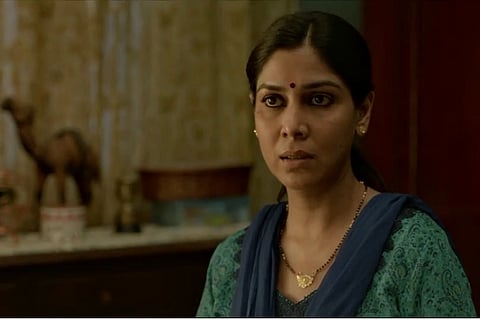

Growing up, my mother used to have migraines. And when she had one, everyone would panic – we would rush to give her the tablet, make her bedroom dark and put her to sleep, fervently hoping that she feels better in a few hours or by the next morning. The same anxiety would set in if my mother had to go out of town for a few days. In contrast, my father falling sick or going out of town for weeks never brought out such a frenzied reaction. Of course, he wasn’t the one who knew all the minute details about the household.
As I watched Ghar Ki Murgi, a short film by Panga director Ashwiny Iyer Tiwari, these memories came flooding back. The 18-minute film, which stars Sakshi Tanwar as Seema, a housewife in a middle class household, shows just how much labour women like her do every day at homes. The Hindi proverb after which the film is named – ghar ki murgi dal baraabar – means, we don’t value what we have. It’s an apt title given how undervalued, and even utterly unacknowledged women’s labour is in a majority of Indian households.
The film shows Seema getting up early, taking care of her in-laws, sending off her two children and husband to the school and office respectively, and also working in a beauty parlour. We see her cook, run after the school bus with her children, make them do homework, take stock of the ration and more. All this is nothing out of the ordinary. Until one day, her husband says something to his friends which Seema hears, and decides to take a month-long break – something she saved for by working at the parlour.
But this is not a film about how a ‘homely’ woman learns to be free as she frolics on Goa’s beaches and watches sunsets. It is the run-up to her trip that is most telling, that reminded me so much of my own time at home and how there were so many anxieties about the woman of the house being unavailable for even a few hours.
In one scene in particular, the rest of the family sits down to figure out how much they need to pay for each task that will be done by hired help in the time that Seema is gone – for cooking, for massaging the mother-in-law’s feet, for taking the father-in-law for a walk, to pay for the children’s tuition fees (because Seema won’t be there to make them do their homework) and so on. It is in that moment that the family – and we as the viewers – see the monetary and human value of the unpaid care work that women do at homes.
The idea of women being ‘natural’ caregivers and the gendered nature of housework – even she works professionally as well – costs them a lot, literally. One estimate by Oxfam states that women and girls globally do unpaid care work for 12.5 billion hours every day, which is worth $10.8 trillion annually. The futility and misplacement of comments like “you just sit at home all day” for homemakers become very apparent.
Ghar Ki Murgi also reminded me of another short film, Juice. The entire film takes place in one evening, where the protagonist is hosting a get-together with a few families at her home. Directed by Neeraj Ghaywan of Masaan fame, the Shefali Shah starrer focuses on a similarly on the gendered nature of household work, and how early this conditioning begins. A particularly uncomfortable and telling scene is one where all the women (mostly wives) who are at the get-together stand in the sweltering kitchen, while the husbands sit comfortably sit in the living room with a cooler, talking and making merry. The division of space within a household is quite revealing. Ultimately, in a powerful scene, Shefali Shah breaks the code to sit in the middle of the living room as she sips juice and everyone falls silent -- showing that even the act of resting before anyone else becomes one of defiance for women.
Personally, the ending of Ghar Ki Murgi was a little disappointing for me. On the other hand though, it was probably more realistic. It also went on to show that emancipation is not always radical or complete. It happens in parts, as we undo our conditioning little by little, as we realise the value of what we have. And at the end of the day, women too are products of the same patriarchal society, and must pick their battles.
Ghar Ki Murgi will premiere on SonyLIV on March 8, International Women’s Day.